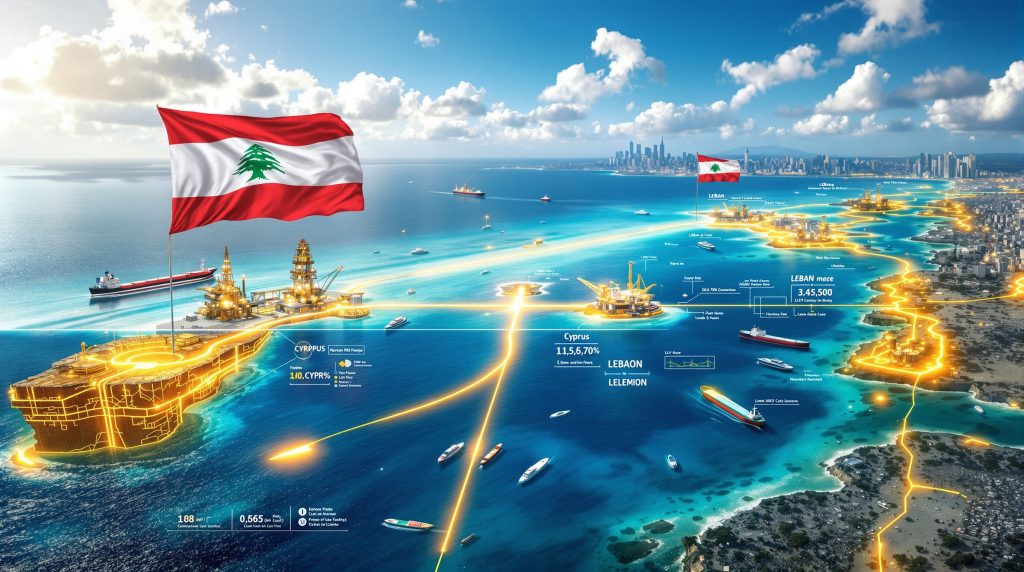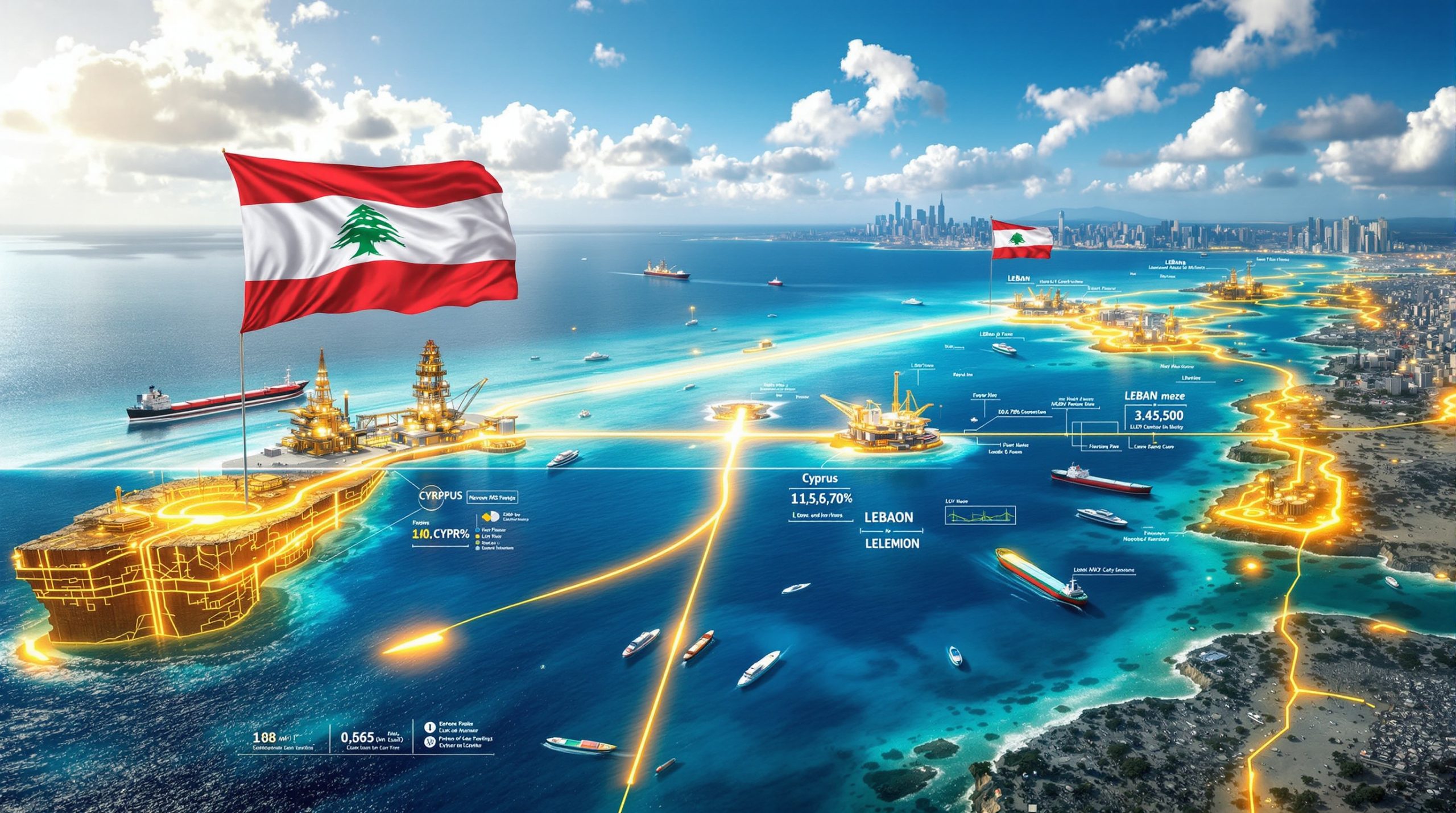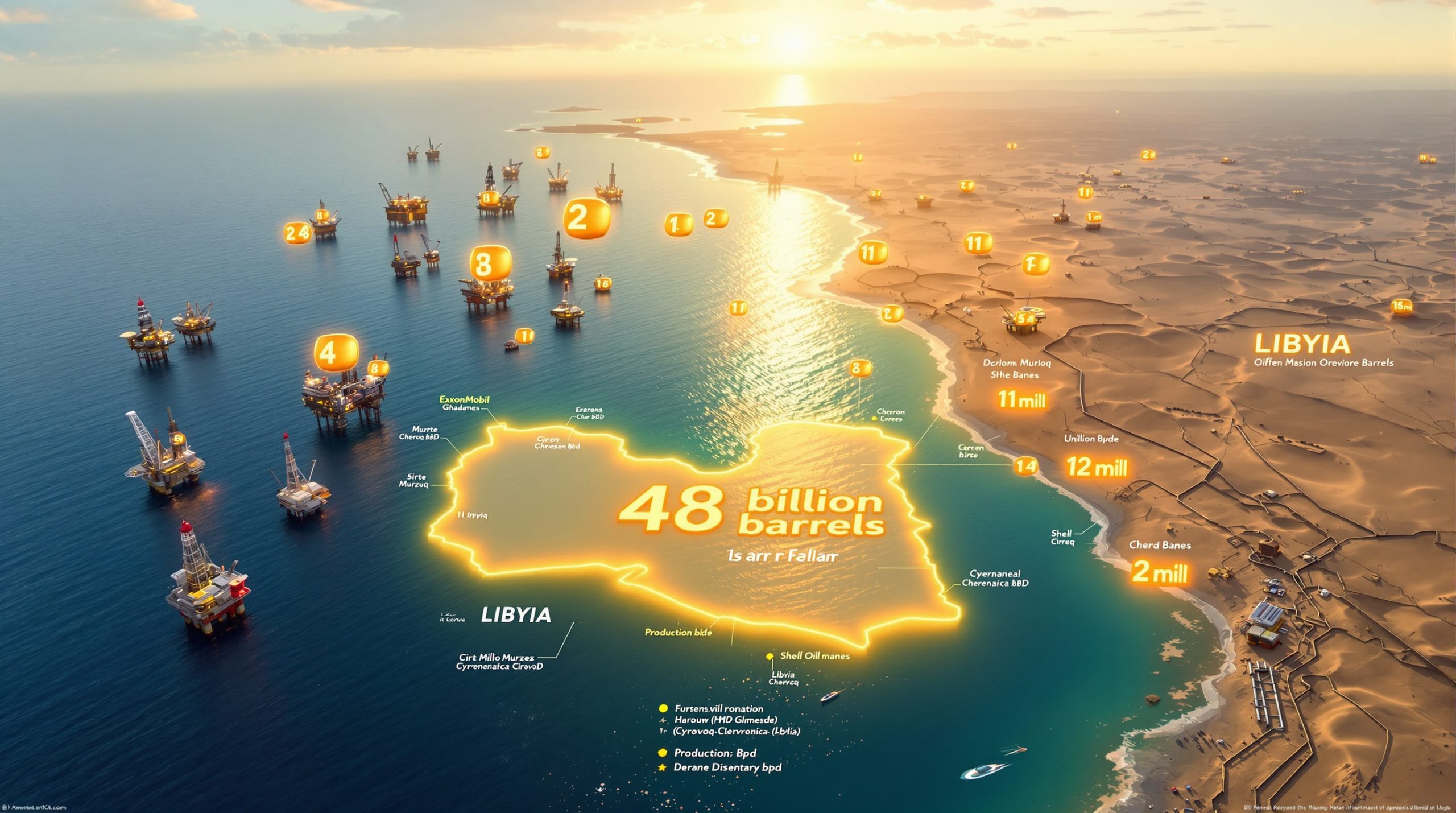Eastern Mediterranean Energy Dynamics and Regional Cooperation Frameworks
The Eastern Mediterranean has emerged as one of the most strategically important energy regions globally, where complex geological formations beneath millennia of sedimentary layers hold vast untapped hydrocarbon reserves. Regional maritime boundary agreements represent critical inflection points that determine whether these resources remain stranded assets or become catalysts for economic transformation. The interplay between international law, energy security imperatives, and regional geopolitical dynamics creates a framework where bilateral cooperation can unlock previously inaccessible energy wealth while reshaping broader Mediterranean energy corridors.
Recent developments in Lebanon Cyprus gas zone agreement negotiations illustrate how maritime boundary demarcation serves as the foundation for systematic resource exploration and development. These agreements establish the legal architecture necessary for international energy companies to commit substantial capital investments while providing both nations with frameworks for revenue sharing and joint development strategies.
How Maritime Boundary Demarcation Transforms Regional Energy Dynamics
The Strategic Importance of Exclusive Economic Zone Delineation
Maritime boundary agreements fundamentally alter the risk-reward calculus for energy exploration by providing legal certainty that international energy companies require before committing substantial capital. The Lebanon Cyprus gas zone agreement establishes clear operational parameters that eliminate boundary disputes that have historically deterred major energy investments in contested waters.
Exclusive Economic Zone (EEZ) delineation enables systematic geological surveys and seismic analysis across previously disputed areas. When boundaries remain unclear, energy companies face potential legal challenges that can invalidate exploration licenses, rendering investments worthless. Furthermore, clear demarcation allows for comprehensive basin analysis and reduces regulatory uncertainty that typically adds risk premiums to project financing.
The Egypt-Cyprus EEZ agreement signed in 2013 provides a successful precedent, directly enabling the development of the Zohr gas field, which became the largest natural gas discovery in the Mediterranean Sea. This field contains an estimated 30 trillion cubic feet of natural gas reserves and demonstrates how boundary clarity can unlock massive energy resources. Similarly, the Israel-Cyprus maritime boundary agreement from 2010 facilitated operations at the Leviathan gas field, which holds approximately 21 trillion cubic feet of recoverable natural gas.
Unlocking Previously Inaccessible Hydrocarbon Reserves
Technical assessments of overlapping maritime zones often reveal geological formations that extend across national boundaries, requiring coordinated exploration strategies. The Lebanon Cyprus gas zone agreement specifically addresses these challenges by establishing frameworks for joint development of trans-boundary resources.
Geological surveys indicate that the Levant Basin contains substantial undiscovered hydrocarbon reserves, with the U.S. Geological Survey estimating 122 trillion cubic feet of recoverable natural gas resources across the broader Eastern Mediterranean region. These reserves are distributed across multiple geological formations that frequently cross maritime boundaries, making bilateral cooperation essential for efficient extraction.
In addition, joint development scenarios typically prove more economically viable than individual exploration efforts due to shared infrastructure costs and coordinated extraction strategies. When resources span multiple EEZs, unified development approaches can reduce total project costs by 20-30% compared to separate national development programs, according to industry analyses.
Economic Implications for Both Nations' Energy Futures
Lebanon's Path to Energy Independence Through Offshore Resources
Lebanon currently faces severe energy transition challenges, with electricity shortages affecting daily life and economic productivity. The country imports virtually all its energy needs, creating substantial fiscal burdens that offshore gas development could potentially alleviate. Current electricity generation capacity meets only 60-70% of national demand, forcing businesses and households to rely on expensive private generators.
The Lebanon Cyprus gas zone agreement opens access to exploration blocks that geological assessments suggest could contain significant natural gas reserves. Initial seismic studies indicate potential recoverable reserves ranging from 10-25 trillion cubic feet across Lebanese offshore areas, though these estimates require confirmation through exploratory drilling.
Revenue projections from successful gas development could transform Lebanon's fiscal position. At current natural gas prices, even modest reserve discoveries of 5 trillion cubic feet could generate government revenues exceeding $15-20 billion over the productive life of the fields, assuming standard royalty and taxation frameworks.
Cyprus's Strategic Position as Regional Energy Hub
Cyprus has positioned itself as a potential regional energy transit centre, leveraging its geographic location to facilitate natural gas exports to European markets. The island's existing energy infrastructure provides foundational capabilities for expanded gas processing and export operations.
The Aphrodite gas field in Cypriot waters contains an estimated 4.5 trillion cubic feet of natural gas reserves and serves as an anchor project for the country's energy development strategy. Consequently, additional discoveries through the Lebanon Cyprus gas zone agreement could justify construction of larger-scale liquefied natural gas (LNG) facilities.
Cyprus's strategic value extends beyond its own resources to its role in diversifying European energy supply chains. European Union policymakers have identified Eastern Mediterranean gas as a critical component of energy security strategies designed to reduce dependence on single-source suppliers. The Reuters reported that the EastMed pipeline project, while facing implementation challenges, represents European interest in establishing alternative gas supply routes.
International Players Positioned for Exploration Opportunities
Energy Companies With Mediterranean Portfolios
Several major international energy companies have established significant presence in Eastern Mediterranean exploration activities. ENI of Italy has emerged as a leading player, with successful operations at Egypt's Zohr field and exploration licenses across multiple Mediterranean basins. The company's technical expertise in deepwater drilling and Mediterranean geology positions it as a potential participant in Lebanon Cyprus gas zone agreement development.
TotalEnergies maintains exploration licenses in Lebanese waters and has committed substantial resources to Eastern Mediterranean projects. The company suspended Lebanese operations in 2020 due to regional instability but has indicated interest in resuming activities under appropriate conditions.
However, deepwater exploration in the Eastern Mediterranean requires specialised technical capabilities and substantial capital investments. Typical exploration wells in the region cost $50-100 million each, while development of discovered fields can require $3-5 billion in infrastructure investments. These capital requirements limit participation to major international energy companies with proven deepwater expertise, particularly amid current oil price rally analysis conditions.
Geopolitical Winners in Regional Energy Development
The European Union represents a primary beneficiary of expanded Eastern Mediterranean gas development. European gas demand remains substantial despite renewable energy growth, with natural gas serving as a transition fuel during the shift away from coal-fired power generation. Eastern Mediterranean gas could provide 10-15% of European gas imports, offering meaningful supply diversification, especially given the current US natural gas forecasts.
Turkey's position regarding Cyprus-Lebanon energy cooperation remains complex, as Turkey maintains different interpretations of maritime boundaries in the region. Turkish opposition to Cypriot energy development has created diplomatic tensions, though economic incentives for regional cooperation could potentially override these disputes.
For instance, regional energy cooperation frameworks benefit from reduced geopolitical tensions and increased economic interdependence. Countries with substantial energy trade relationships typically experience fewer military conflicts, as disrupting energy flows imposes significant economic costs on all parties.
Comparison to Other Regional Energy Partnerships
Successful Mediterranean Energy Collaborations
| Agreement Type | Countries | Year Signed | Key Outcomes |
|---|---|---|---|
| EEZ Demarcation | Egypt-Cyprus | 2013 | Enabled Zohr gas field development |
| Maritime Boundary | Israel-Cyprus | 2010 | Facilitated Leviathan field operations |
| Joint Development | Greece-Italy | 2020 | Poseidon pipeline framework |
| Trilateral Cooperation | Greece-Cyprus-Israel | 2022 | EastMed pipeline planning |
These agreements demonstrate that successful energy cooperation requires clear legal frameworks, technical coordination mechanisms, and dispute resolution protocols. The Egypt-Cyprus agreement serves as the most relevant precedent for the Lebanon Cyprus gas zone agreement, as both involve similar geological conditions and development challenges.
Technical and Legal Framework Innovations
The Lebanon Cyprus gas zone agreement incorporates lessons learnt from previous Mediterranean energy partnerships. United Nations Convention on the Law of the Sea (UNCLOS) principles provide the legal foundation, while specific provisions address revenue sharing, environmental protection, and operational coordination.
Environmental protection standards require comprehensive impact assessments and monitoring protocols for marine ecosystems. Mediterranean biodiversity protection demands careful coordination between energy development and conservation objectives, with specific attention to marine mammal migration routes and sensitive habitat areas.
Furthermore, dispute resolution mechanisms typically include arbitration procedures and technical expert panels to address operational conflicts without disrupting energy development activities. These frameworks prove essential when complex technical issues arise during exploration and development phases.
Implementation Challenges and Risk Factors
Political Stability Requirements for Long-Term Success
Lebanon's internal political dynamics create uncertainty regarding energy policy continuity and contract enforcement. The country has experienced significant political instability, economic crisis, and institutional challenges that could affect long-term energy development projects.
Regional security considerations remain paramount for offshore energy operations. Energy infrastructure represents high-value targets that require substantial security investments. Insurance costs for Eastern Mediterranean energy projects typically include risk premiums reflecting regional security challenges.
Additionally, international sanctions regimes could potentially complicate energy development if regional conflicts escalate. Energy companies must navigate complex compliance requirements while maintaining operational flexibility to respond to changing geopolitical conditions, particularly given potential tariffs market impacts.
Technical and Financial Hurdles
Infrastructure development costs for deepwater exploration exceed those in more established energy provinces. Eastern Mediterranean projects require specialised vessels, drilling equipment, and subsea infrastructure designed for specific geological and environmental conditions.
Realistic development timelines extend significantly longer than initial projections in most cases. From initial exploration to commercial production, Eastern Mediterranean gas projects typically require 8-12 years, assuming no major technical complications or regulatory delays.
However, market conditions affecting natural gas demand and pricing create additional uncertainty for project economics. European gas markets have experienced substantial volatility, affecting long-term price forecasts that underpin project financing decisions.
Projected Timeline for Energy Production and Economic Impact
Realistic Development Schedule
Phase 1: Seismic Surveys and Geological Assessment (2025-2027)
- Comprehensive seismic data acquisition across agreed zones
- Geological modelling and reserve estimation
- Environmental baseline studies and impact assessments
- Initial exploration well planning and permitting
Phase 2: Exploratory Drilling and Reserve Confirmation (2027-2029)
- Initial exploration wells in priority areas
- Reserve confirmation and field delineation
- Technical feasibility studies for development options
- Commercial negotiation frameworks
Phase 3: Commercial Production and Export Infrastructure (2029-2032)
- Development well drilling and subsea infrastructure
- Processing facility construction and pipeline development
- First gas production and export operations
- Full-scale commercial operations
Economic Impact Projections
Job creation estimates suggest 3,000-5,000 direct employment opportunities across both countries during peak development phases, with additional indirect employment in supporting industries. Skilled technical positions will require international expertise initially, with local workforce development programmes providing long-term employment growth.
Government revenue projections depend heavily on reserve discoveries and natural gas price assumptions. Using conservative estimates of 10 trillion cubic feet of recoverable reserves and current gas pricing, combined government revenues could reach $25-35 billion over 20-year production periods.
In addition, regional energy price stabilisation effects could reduce energy costs for both countries while providing export revenues. Domestic gas consumption could replace more expensive fuel imports, improving trade balances and energy security simultaneously.
Broader Mediterranean Energy Policy Implications
Precedent Setting for Remaining Boundary Disputes
The Lebanon Cyprus gas zone agreement establishes important precedents for resolving other regional maritime boundary disputes. Syria-Lebanon maritime boundary negotiations represent the next logical step, as Syrian offshore areas likely contain similar geological formations, particularly considering exploration licenses impact across the region.
Template frameworks from successful agreements can accelerate future boundary demarcation processes. Standardised approaches to revenue sharing, environmental protection, and dispute resolution reduce negotiation complexity and implementation timeframes.
Furthermore, integration with broader Eastern Mediterranean energy cooperation frameworks could create regional energy partnerships spanning multiple countries. The East Mediterranean Gas Forum provides institutional coordination for these expanded cooperation efforts.
Strategic Implications for European Energy Security
European Union energy diversification strategies prioritise alternative supply sources that reduce single-supplier dependencies. Eastern Mediterranean gas development aligns with European energy security objectives while providing economic development opportunities for regional partners.
Mediterranean gas corridor development could handle 15-20 billion cubic metres of additional natural gas imports annually, representing meaningful supply diversification for European markets. These volumes would constitute 4-5% of total European gas consumption.
Consequently, renewable energy transition timelines benefit from natural gas as a bridge fuel that provides grid stability while intermittent renewable sources expand. Natural gas generates 50% fewer carbon emissions than coal for electricity generation, supporting European climate objectives during the transition period.
Investment Opportunities and Economic Development Catalysts
Direct Energy Sector Investment Prospects
Exploration and production opportunities attract major international energy companies with deepwater expertise and substantial capital resources. Project financing typically requires $2-4 billion for full field development, creating opportunities for energy sector investors and project finance specialists.
Marine services and offshore equipment suppliers benefit from sustained regional exploration activities. Specialised vessel requirements, drilling services, and subsea equipment create multi-year contract opportunities for service sector companies.
Additionally, LNG infrastructure and transportation investments could support regional export capabilities. LNG terminal development costs range from $1-3 billion depending on capacity and technical specifications, representing substantial infrastructure investment opportunities.
Broader Economic Development Benefits
Electricity interconnection projects become financially viable when reliable gas supplies support regional power generation. Cross-border electrical connections could enhance grid stability while creating additional energy trade opportunities.
Telecommunications infrastructure expansion often accompanies major energy projects, as operators require reliable communications for offshore operations. Fibre optic cables and communications equipment create spillover benefits for regional connectivity.
However, tourism and maritime services sectors experience positive effects from improved regional cooperation and economic development. Enhanced regional stability and infrastructure development support broader economic growth across multiple sectors.
Regional Stability and Long-Term Cooperation Benefits
Economic Interdependence as Conflict Prevention
Energy cooperation creates substantial economic incentives for maintaining peaceful relationships between participating countries. Disrupting energy operations imposes significant financial costs that discourage military conflicts and encourage diplomatic resolution of disputes.
The Lebanon Cyprus gas zone agreement represents a model for transforming resource competition into cooperative development frameworks. Rather than competing for contested resources, countries can maximise mutual benefits through coordinated development strategies.
For instance, institutional cooperation frameworks established for energy development provide mechanisms for addressing broader regional challenges. Technical cooperation, environmental coordination, and dispute resolution mechanisms create institutional capacity that extends beyond energy sector applications.
What Makes This a Model for Global Energy Partnership Development?
Eastern Mediterranean energy cooperation demonstrates how regional partnerships can unlock stranded energy assets while promoting economic development and political stability. These frameworks provide templates for similar cooperation arrangements in other regions with trans-boundary energy resources.
The Times of Israel reported that such agreements create sustainable precedents for international energy diplomacy. Furthermore, successful implementation could inspire similar collaborative approaches in regions facing comparable maritime boundary challenges, from the South China Sea to the Arctic Ocean.
Disclaimer: This analysis involves projections and estimates that are subject to substantial uncertainty. Energy exploration carries significant technical and commercial risks, and actual outcomes may differ materially from projections. Investment decisions should consider comprehensive risk assessments and professional advice.
The information presented reflects current understanding of regional energy dynamics and should not be considered as investment advice or guarantees of future outcomes. Energy market conditions, geological assessments, and political developments can significantly affect project viability and economic projections.
Interested in Eastern Mediterranean Energy Investment Opportunities?
Discovery Alert's proprietary Discovery IQ model provides real-time alerts on significant ASX mineral and energy discoveries, helping investors identify actionable opportunities in exploration companies with Mediterranean and global portfolios. Experience why major discoveries can lead to substantial market returns by exploring Discovery Alert's dedicated discoveries page, showcasing historic examples of exceptional outcomes, and begin your 30-day free trial today to position yourself ahead of the market.




